TRC Presentations and Activities at the 2025 Annual Meeting of the Transportation Research Board
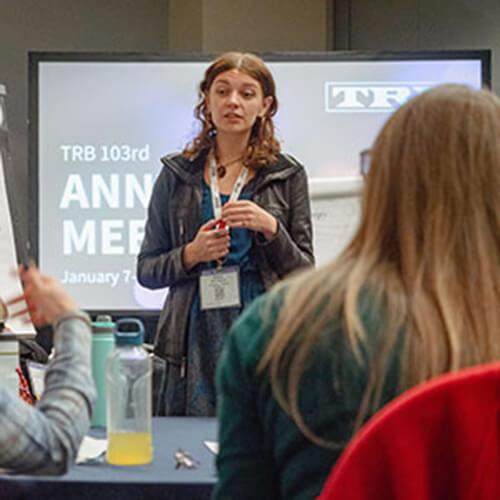
Faculty, staff and students affiliated with the University of Vermont Transportation Research Center will be participating in 12 presentations and activities at the 104rd Annual Meeting of the Transportation Research Board in Washington, DC this January. Learn more at the link below about the research we will be presenting at this year's meeting.
TRC Presentations and Activities at the 2024 Annual Meeting of the Transportation Research Board
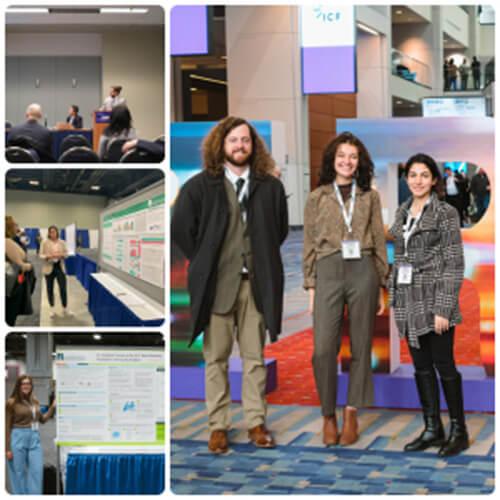
Faculty, staff and students affiliated with the University of Vermont Transportation Research Center will be participating in 23 presentations and activities at the 103rd Annual Meeting of the Transportation Research Board in Washington, DC this January. Learn more at the link below about the research we will be presenting at this year's meeting.
Summary of UVM TRC Transportation Research Board Annual Meeting Presentations and Activities (PDF)
Dwight D Eisenhower Transportation Fellowship Program
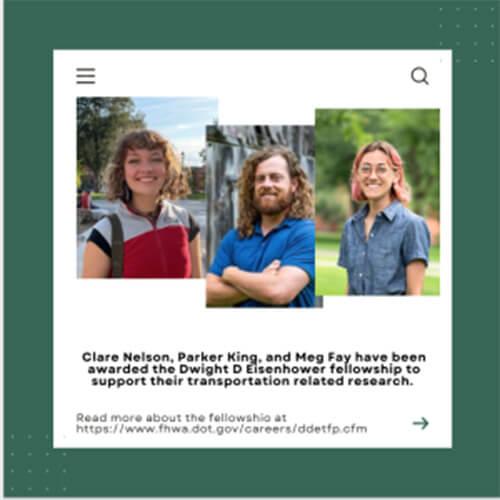
Clare Nelson, Meg Fay, and Parker King have been awarded a grant from the Dwight D Eisenhower Transportation Fellowship Program.
Dana Rowangould hosts webinar
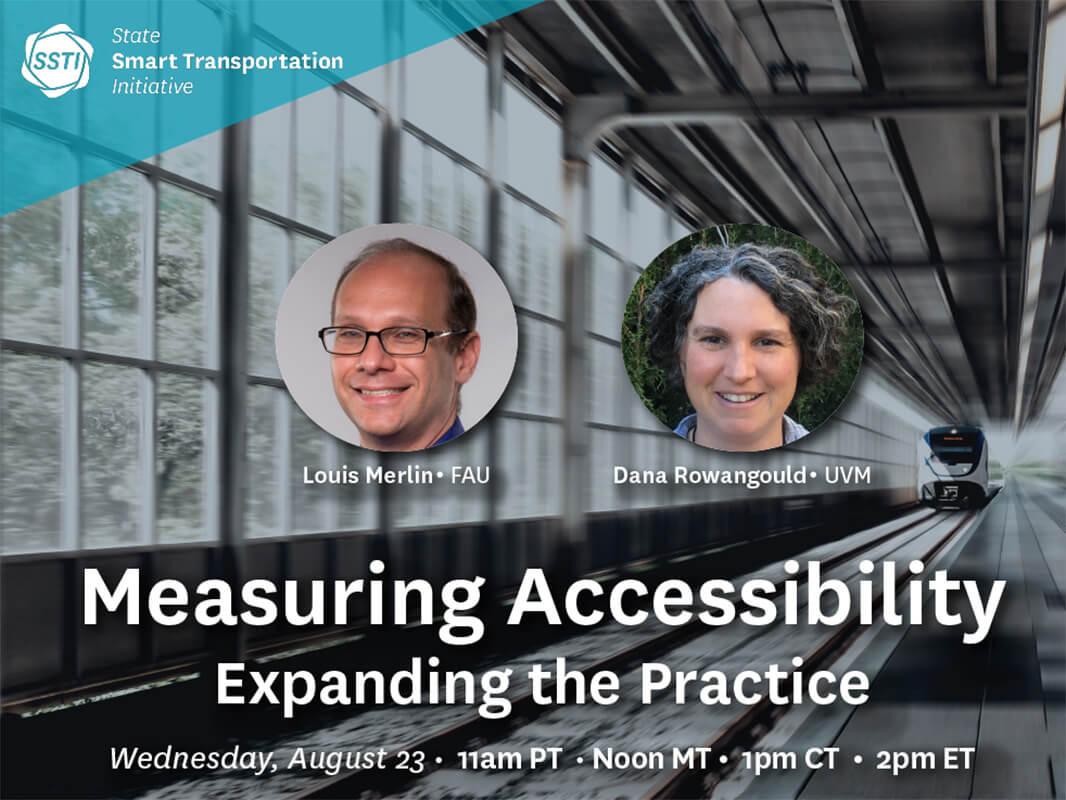
Dana Rowangould and Louis Merlin from Florida Atlantic University will be giving a webinar focused on their research on pedestrian accessibility. Visit State Smart Transportation Initiative for more information.
TRC investigators begin research on recovery for flooding in VT

The TRC’s Sarah Grajdura and Dana Rowangould will be starting a new research project focused on the role of mobility, housing, and infrastructure in equitable flood recovery in Vermont. This effort will build upon the research team’s ongoing research on the transportation needs of those with limited access to vehicles in the largely rural Northeast Kingdom region of Vermont. The project will include interviews and surveys of those affected by the July 2023 flood to better understand how floods affect rural Vermonters, particularly those with fewer resources. The objective of this research is to better understand the factors that contribute to peoples’ ability to adapt and recover from natural disasters, which are expected to become more frequent and more severe with climate change. The team is excited to continue their partnership with several organizations who are working to address poverty and improve community resilience in the Northeast Kingdom. Sarah Grajdura, the postdoctoral scholar who will be leading this project, brings experience in post-disaster research from her dissertation research, which evaluated evacuation and post-disaster sheltering following the 2018 Camp Fire in northern California.
RRFB Project Earns National High Value Research Project Recognition
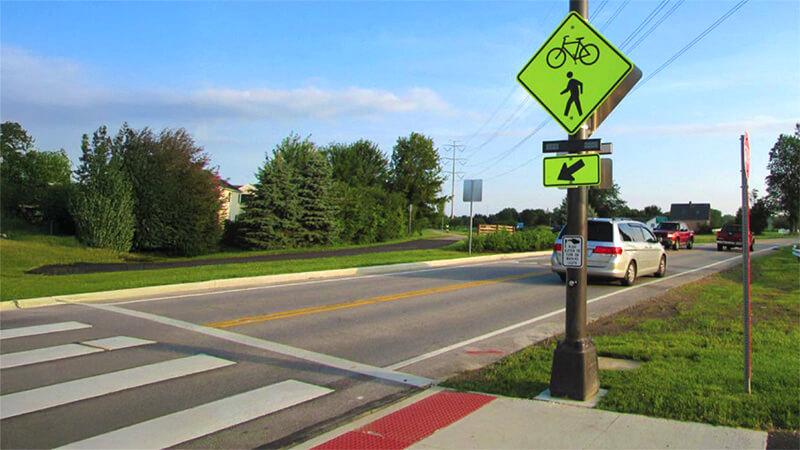
Dr. Dana Rowangould, James Sullivan, and Parsa Pezeshkhejad's research has been recognized as a 2024 High-Value Research (HVR) project. The American Association of State Highway and Transportation Officials Research Advisory Committee (AASHTO RAC) selects only 16 projects to be selected as High-Value Research projects. Our researcher's work on the VTrans project Effectiveness of Rectangular Rapid Flashing Beacons (RRFBs) at Mid-Block Crosswalks has been one of the few selected. For more information on this project, see our current projects.
A&WMA Annual Conference and Exhibition
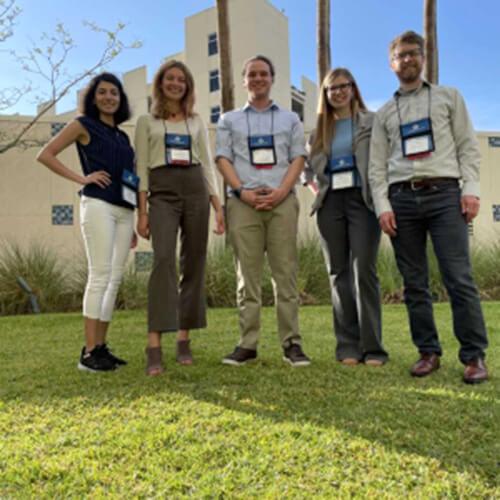
TRC was represented well at the Air and Waste Management Association's 116th Annual Conference and Exhibition in Orlando, Florida.
This year's conference was titled Smart Growth: Balancing Development, Restoration, and Resiliency. Researchers nationwide shared their findings and solutions surounding this topic through presentations, panels, and posters. Our very own Greg Rowangould, Brittany Antonczak, Harry Schukei, Clare Nelson, and Narges Ahmadnia presented their research.
Projects:
Whose Emissions Are You Breathing? Evaluating the Contributions of Urban, Suburban and Rural Households To Mobile Source Emission Exposure
Presented By: Mitchell Robinson, Gregory Rowangould, Mohammad Tayarani (Carb)
An Updated Census of the US Near-Roadway Population and Multiscale Equity Analysis Using Novel Mobile Source Emission Exposure Surrogates
Presented By: Gregory Rowangould, Brittany Antonczak, Tammy Thompson (Edf), Mindi W. Depaola (Edf)
A Deeper Look into The Relationships Between Travel Behavior and The Built Environment using Data on Relocated Households in Vermont
Presented By: Clare A. Nelson, Gregory Rowangould
Can Smart Growth Reduce Vehicle Travel in Rural Communities?
Presented By: Harry Schukei, Dana Rowangould
A Spatial Analysis of the Fuel Economy Rebound Effect Focusing on Small and Rural Communities.
Presented By: Narges Ahmadnia, Gregory Rowangould
TRC Receives Significant Funding
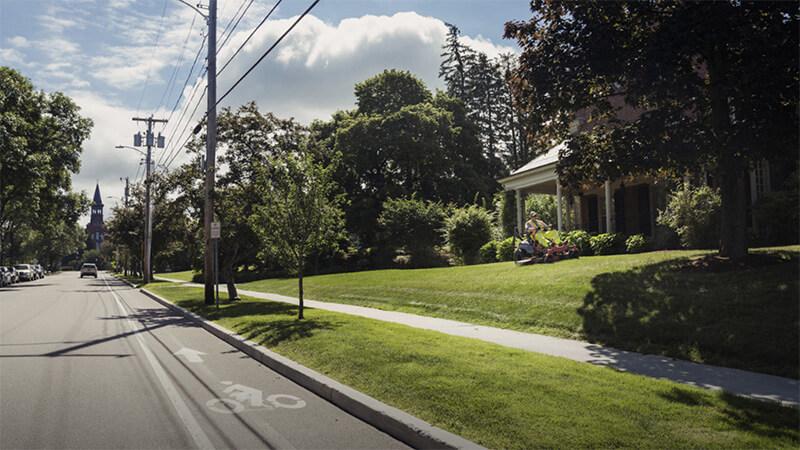
In March 2023, the UVM TRC was awarded $20 million by the U.S. Department of Transportation (DOT) as a part of funding for research on sustainable and equitable travel in rural areas. This funding is vital in finding solutions to the evergrowing problems that many of our communities in Vermont and worldwide face regarding transportation.
2023 Transportation Research Board's Annual Meeting Recap
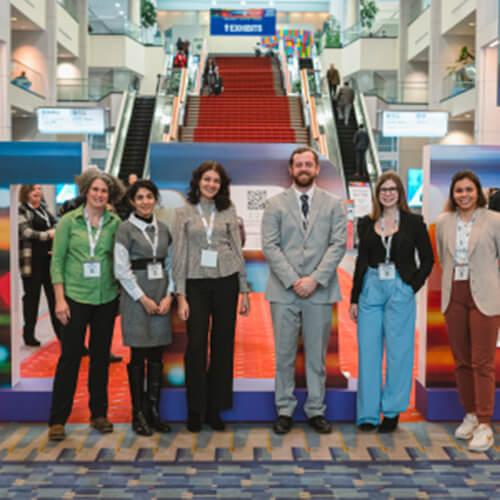
This January, the UVM Transportation Research Center (TRC) attended the Transportation Research Board's Annual Meeting (TRBAM) in Washington, DC. The TRC was well represented with 12 faculty and students that presented their research on a number of topics surrounding transportation. TRC faculty and students were able to not only present their research, but attended more than 600 workshops, poster sessions, and lectern sessions with thousands of other transportation professionals. This year's spotlight theme of the meeting was Rejuvenation Out of Disruption: Envisioning a Transportation System for a Dynamic Future.
Stephen Montaño Defends Thesis
Travel Behavior, Attitudes, and Barriers to Change in Small and Rural Communities
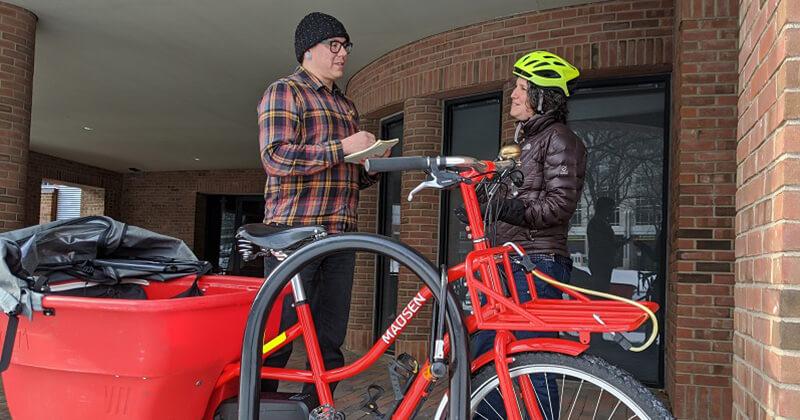
Travel behavior and its underlying factors in small and rural communities has been historically understudied in transportation research. By understanding these factors and behaviors, a clearer picture of these regions can be drawn so that meaningful change towards greenhouse gas reductions can be realized. My research aims to examine barriers to making sustainable travel behavior changes such as using multi-modal transportation, reducing overall amounts of travel, or moving to locations closer to necessary services. I do this by first evaluating what “rural” means in terms of existing definitions of the term. I then analyze interviews conducted with Vermonters to get first-hand accounts of what types of change people think are possible as well as the barriers to achieving this change. The assessment of rural definitions analyzes vehicle miles traveled (VMT) calculated from statewide inspection and registration data under multiple definitions of urban and rural. Large discrepancies were found to occur in VMT depending on the definition used, and common presuppositions, such as rural areas being those that experience the highest VMT, are directly questioned. The results presented here suggest that multiple ways of defining rurality can conclude differing results, and that the way in which we classify rural areas should be reevaluated. The interviews then employed questions on day-to-day challenges of traveling, suggestions for reducing greenhouse gas emissions in their communities, responses to fuel prices, and opinions on electric vehicles were asked. Rural areas struggle most frequently with traveling long distances to reach services, while urban areas are more concerned with traffic, opinions on EV ownership were consistent across the state, with people being likely to consider owning an EV if costs of ownership were to decrease. These two components of my research highlight that rural travel behavior stereotypes may not accurately reflect reality and that while there are barriers, opportunities exist to bring about greenhouse gas emissions reductions from transportation in small and rural communities.
TRC Sends off 2021 Graduates
This Spring, the TRC sent off several undergraduate and graduate researchers to start their lives and careers beyond UVM. Some students are entering the workforce as transportation planners and engineers, while others are continuing their studies at the graduate level. Here are just a few ways our students will bring what they have learned from their research to support more sustainable, equitable, and resilient transportation systems in Vermont and beyond.
2022 Transportation Research Board's Annual Meeting Recap
The UVM Transportation Research Center was well represented at the 101st Annual Meeting of the Transportation Research Board held in Washington, DC from January 9 – 13, 2022. Four students and three TRC faculty and staff members presented their research on rural travel issues, transit equity and infrastructure monitoring, lead conference sessions, and networked with colleagues and transportation experts from across the globe.
Erica Quallen, a Civil and Environmental Engineering Master’s student, who conducts research with the TRC, presented two posters describing her thesis research that aims to lay a new foundation for better understanding rural travel behavior. Erica found the poster sessions invaluable because she was able to talk about her work and engage in discussions with a wide variety of people who were just as excited about transportation issues as she is. Her paper, Consistently Inconsistent: An Assessment of Definitions of Rural and Travel Behavior Outcomes in Vermont received a lot of positive recognition as a foundation piece of research furthering our understanding of rurality and how to measure travel behavior in rural areas. Erica’s experience at the TRB Annual Meeting was energizing and reinforced her resolve to continue in the field of transportation research, as “no matter what project I take on, there will always be more questions to ask, and that’s really exciting.”
Sierra Espeland won the prestigious Dwight David Eisenhower Transportation Fellowship (DDETFP) Achievement Award: 2021 Top Ranked Master’s Fellowship Fellow, for her research “Travel Burdens in Rural U.S. Households”. Sierra is a first-year Civil and Environmental Engineering Master’s student working with Dr. Dana Rowangould. She also presented preliminary results from her MS thesis research in a lectern session.
Julia Clarke, a senior Civil Engineering BS student and Barrett Scholar shared the stage in a lectern session with some of the world’s top travel behavior researchers to present her work on how the travel of Vermonters was affected by the COVID-19 pandemic. Julia’s research with the TRC offers a unique perspective on the different impacts felt by people living in urban, suburban, and rural communities.
Summary of TRC faculty and student presentations:
Lectern Session 1363: Advances in the Analysis and Modeling of Greenhouse Gas Mitigation Strategies and Air Quality. Led by Greg Rowangould: TRC Director
Poster Session 1196: Current Issues in Air Quality and Greenhouse Gas Mitigation. Led by Greg Rowangould: TRC Director
Title: A Comparative Analysis of Opportunities and Barriers for Changing Travel Behavior and Reducing GHG Emissions in Small and Rural Communities. Erica Quallen, Graduate Student; Greg Rowangould, TRC Director; Julia Clark, Undergraduate Student; Clare Nelson, Undergraduate Student
Abstract: This paper examined travel attitudes in a majority rural state (VT) by speaking directly with VTers about day-to-day travel challenges, suggestions for GHG reduction, responses to fuel prices, and opinions on electric vehicles. Rural areas struggle with travelling long distances for services, while urban areas are concerned with traffic, with both rural and urban respondents being open to EV purchase if prices dropped. These interviews highlighted key questions for policy-makers to develop practical and effective policies to reduce GHG in rural areas.
Poster Session 1097: Planning for Accessible, Equitable Cities
Title: Consistently Inconsistent: An Assessment of Definitions of Rural and Travel Behavior Outcomes in Vermont. Erica Quallen, Graduate Student; Greg Rowangould: TRC Director
Abstract: The varying definitions of rurality across state and federal departments do not allow for an accurate portrayal of community nuances and their travel behavior. VMT under multiple definitions of “rural” and “urban” were analyzed. The results suggest that different definitions of rurality conclude in differing results and the way rural areas are classified should be reevaluated in order to effectively target policies aimed at understanding the travel behavior and social characteristics of an area.
Lectern Session 1322: The Depth and Breadth of Covid-19 Impacts on Travel Behavior
Title: The Impacts of COVID-19 on Travel Behavior in Small and Rural Communities. Julia Clarke, Undergraduate Student; Erica Quallen, Graduate Student; Clare Nelson: Undergraduate Student; Greg Rowangould: TRC Director
Abstract: COVID-19 impacted how people travel, and this study conducted interviews with Vermonters to better understand this change. Differences across urban, suburban and rural communities was compared. Those living in more rural areas did not experience significant changes in travel behavior; walking increased in all communities, suggesting that walking and biking levels during the pandemic should impact public policy as it relates to travel infrastructure.
Lectern Session 1331: Evaluating Innovative Public Transportation Fare Policies: Fare Capping, Transfer Policies, and Integration with Mobility on Demand
Title: A Flexible Itinerary-Based Fare Calculator with Detailed Transfer Modeling. Mitchell Robinson, TRC Research Analyst
Abstract: The ability to accurately estimate transit fares with a given itinerary has wide applications in equity and accessibility research, analysis of fare policy, and customer service. This paper outlines a fare calculation tool developed as part of an accessibility and equity analysis of seven major US urban areas.
Poster Session 1058: High-Value Research at State DOTs: Sweet 16. Dryver Huston, TRC Associated Faculty, Professor, Mechanical Engineering
Title: Hydraulic Inspection Vehicle Explorer (HIVE 2.0) for Culvert Upgrades
Abstract: This project researched the design, fabrication and testing of a lightweight and low-cost inspection vehicle that enables movement through small, flooded culverts.
From Your Recycling Bin to the Roadway
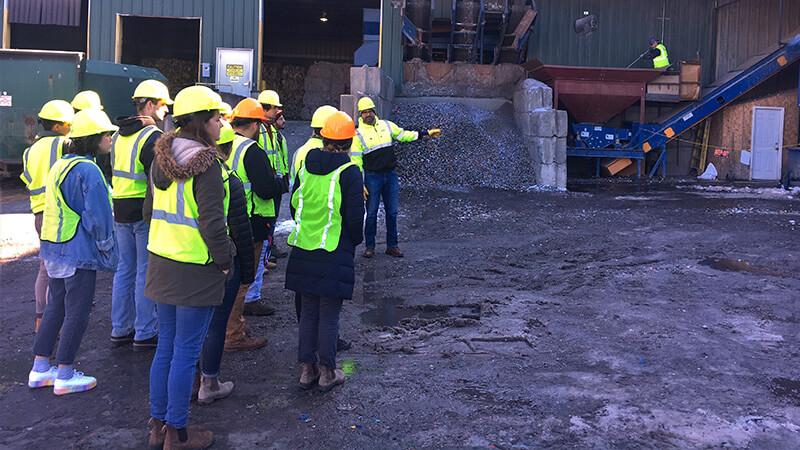
Professor Mandar Dewoolkar is leading a team on a new TRC research project, supported by the Transportation Infrastructure Durability Center, that is investigating how Processed Glass Aggregate may be able to replace sand-based materials in transportation projects in Vermont.
TRC Director presents Policy Insights at Capitol Hill Briefing
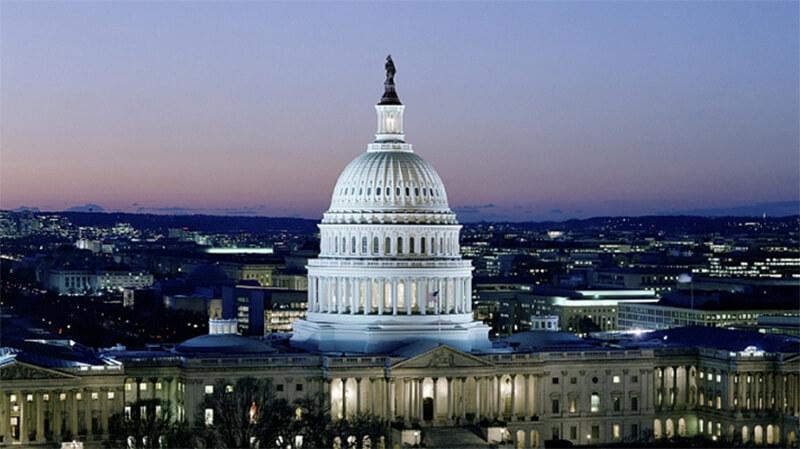
In February, UVM Transportation Research Center Director, Dr. Greg Rowangould, participated in a Capitol Hill briefing on electric vehicle markets hosted by the National Center for Sustainable Transportation. Dr. Rowangould addressed some of the successes, barriers, and policy gaps that Vermont and neighboring states in the northeast face with electric vehicle adoption as largely rural states in cold climates.